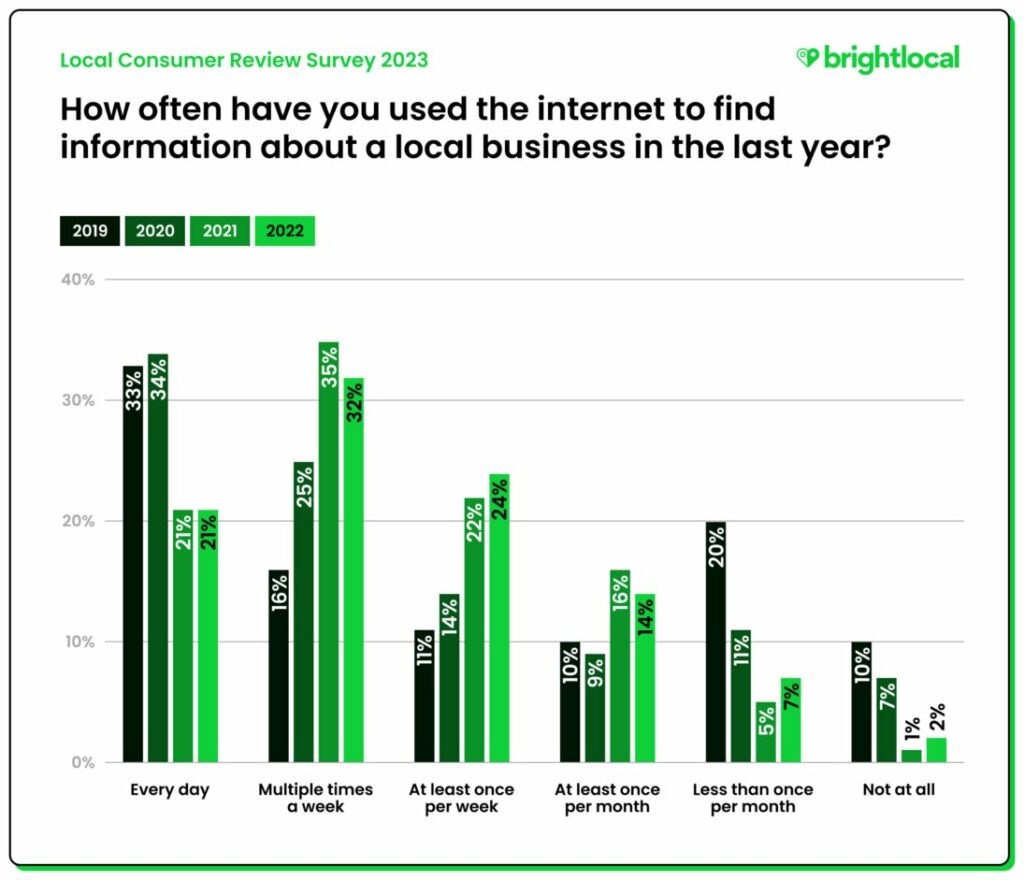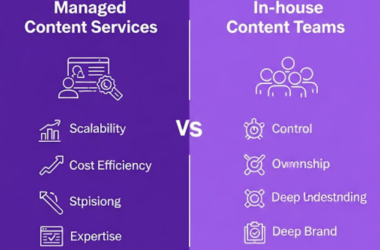Last updated on December 4th, 2023
Table of Contents
Want more footfall on your stores or business channels? Go for local SEO.
A BrightLocal survey report found that 87% of people leverage Google to evaluate local businesses (2022). Extrapolating that number, if your business isn’t showing up on the local search results, chances are you won’t get the traffic to your website (or brand exposure) you envisioned.

Let’s track down how consumers search locally for a business and what you can do to improve local SEO keyword research.
What is Local Keyword Research?
Local keyword research is an exercise businesses engage in to discover the regional keywords or keyword locations their target audience uses to search for services or products in their niche.
The primary purpose of local keyword research is to optimize the web channels to appear in the results for users in a specific area when they search for the business’s products or services.
Local SEO keywords tell a business exactly what their users are searching for. It empowers them to provide their users with the right and relevant information when they search locally for the business’s offerings.
Why is Keyword Research Important For Local SEO?
Keyword research for local SEO is pivotal for businesses trying to understand exactly what their target consumer is searching for.
Below are more reasons to consider optimizing your web channels for local SEO keywords:
- Local keyword research helps businesses generate more leads and boost sales. A report published by ReviewTrackers found that about 42% of the millennials who search locally for a business visit it.
- Optimizing local SEO helps businesses rank higher in local search results.
- It is an important tool to generate and publish relevant and targeted content, helping establish brand authority in a competitive market.
- It is an excellent tool that businesses can use to refocus their products or services to new markets completely.
- Local keyword research helps businesses streamline their expansion into related markets in newer regions.
- Since most consumers leverage mobile devices today, local SEO optimization can help businesses make it easier for the target audience to find them in mobile searches.
- Local keyword optimization is especially beneficial for businesses with local stores. It can help them boost the footfall inside their stores.
How Can You Find Local Keywords?
The best way to find local and regional keywords is to take one of your business’s services and punch it into search engines with your target location. Let’s take an example.
If you launch Google and punch in the search term “Home appliance repair in Pune,” you get the following results:

Below the business listings, the search results show several businesses that have leveraged this local keyword and its variations (appearing in bold text) to optimize their pages for local search. You can note these down.

Additionally, if you scroll to the bottom of the search results, you will notice the “Related searches” section, where Google conveniently lists down the other queries that users punch in to search for similar services or products:

The best part is that this can be done without using any keyword research tools. However, this will only get you so far. If you require more robust local keyword research and know the search volumes and competition for every keyword, you inevitably need a specialised keyword research tool.
For example, Ahrefs is a popular keyword research tool that businesses frequently utilize for this purpose. Once you have the list of all the services you are trying to rank for in local search, you can launch the Ahrefs tool and generate a list of all the local keywords your target audience uses to search for these services.
You can also get the tool to list similar terms that are used.

To make your local search efforts even more effective, you can consider leveraging high-intent modifiers like:
- “ – near me”; for example, “Home appliance repair near me.”
- “ – in my area”
- “Local – “; for example, “local home appliance repair” or “Pune home appliance repair”
With these keywords, the consumer is highly intent to get things done. If your business takes the right initiative, this could help you boost conversions.
How to Handle Multiple Locations
If your business operates across several locations, you want to rank high for each of them. The best way to do that is to find the right local keywords for each location separately.
For example, for “Home appliance repair in Pune,” you can modify the local search with keywords using “Kharadi home appliance repair” or “Home appliance repair in Viman Nagar, Pune”.
You can optimize your webpage to rank for the local keywords across all the locations and areas where your business has branches.
Best Tools to Find and Track Your Local Keyword Rankings
Below is a list of the most popular tools you can use for local SEO keyword research:
Ahrefs

Ahrefs is a toolset that provides everything you need related to SEO. It has the following tools:
- Site explorer
- Competitor analysis
- Site audit
- Website optimization
- Keywords explorer (local, regional, global)
- Content idea generation
- Rank tracker
These tools form a comprehensive set of holistic SEO practices that are extremely effective.
SEMrush

SEMrush is more of a holistic content marketing tool that can also be used for effective keyword research. It has a robust set of features, including:
- Keyword research
- On-page SEO
- Competitor analysis
- Content marketing
- Local SEO
- Rank tracking
- Social media management
- Link building
- Content creation, optimization and distribution
- Market analysis
- Paid ads and PPC
SERanking

SERanking is an SEO and marketing tool tailored to agencies; however, businesses can leverage its keyword research capabilities. It has great features:
- Keyword research and keyword rank tracker
- Backlink checker and monitoring
- Competitor research
- On-page SEO checker
- Website audit and page change monitoring
- Content editor and SERP checker
KWFinder

KWFinder is a quick and effective way to find local keywords for your business. It is an intuitive tool that allows you to perform competitor keyword analysis.
The tool also provides you with search volumes for each keyword, including for local keywords. You can also do a SERP analysis using KWFinder.
Get Local SEO Done Right
Local keyword research helps your business become visible to your local target consumer. You could welcome this consumer to your stores and boost one-on-one sales. Since 98% of people go online to find information about a local business, performing local SEO keyword research is essential to boost lead generation and conversion.
However, finding local SEO keywords is not enough to drive success home – you must also create high-quality content. The most crucial content strategy for local SEO is blogging. And that’s where Wittypen’s expertise lies.
We can help you craft thoroughly engaging content centered around local keyword research and apply best practices to enhance the local content on your website.
Let’s make it happen – get in touch with us today!
FAQs
What is local SEO keyword research?
Local keyword research is discovering the search terms and queries that target consumers use to search for specific services or products online.
Why is local SEO keyword research important for businesses?
Optimizing for local searches helps businesses enhance local visibility and brand awareness for the target consumers residing in the same area, region, or city.
How can I identify the right local keywords for my business?
The right local keywords depend on key services and key localities of service of your business. This is where you should focus your local search on.
What are some common mistakes to avoid in local SEO keyword research?
Some of the common mistakes to avoid are keyword stuffing, ineffective internal linking, ignoring search intent, ignoring customer communications from local searches, and only targeting high-volume keywords.
How can I measure and monitor the performance of local SEO keywords?
You can use keyword ranking tools to understand how each local keyword performs on searches.









